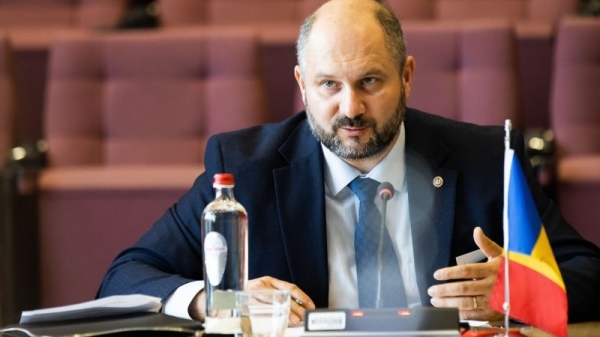Moscow ‘hostage’ of its own energy games in Moldova, minister says

Moldova’s breakaway region of Transnistria continues to enjoy “de facto free gas” from Russia’s Gazprom – a situation which satisfies no one but ensures political stability in the Russian-controlled region, the country’s energy minister told EURACTIV in an exclusive interview.
When the Kremlin launched a full-scale military attack on Ukraine in February last year, Russia was supplying 100% of Moldova’s gas needs. The country was so reliant on Russian gas that it did not even have an energy ministry back then.
Since December though, Moldova has stopped purchasing gas from Russia entirely, and – with help from the European Union – started supplying itself on the international market instead.
And for the first time in the country’s history, Moldova now also has an energy ministry, headed by Victor Parlicov, the former director of the National Agency for Energy Regulation, who was appointed in February.
But that does not mean Moldova is done with Russian gas just yet.
“Russian gas still has a role,” Parlicov told EURACTIV this week.
This is because of a special deal that Moscow carved out for Moldova’s breakaway region of Transnistria, which is pro-Russian and not recognised internationally, he explained.
“Basically, Gazprom supplies de facto free gas to the Transnistria region,” Parlicov said while on a visit to Brussels to attend the 4th EU-Moldova High Level Energy dialogue.
In the rest of the country, “we’re basically buying gas from international markets. And actually, we managed to buy it cheaper than under the Gazprom contract,” he said.
For Moldovan authorities, this has led to a paradoxical situation. While the pro-European government in Chișinău has successfully weaned itself off its Russian gas addiction, the separatist Transnistria region is still reliant on Moscow for its energy supplies, which keeps it independent from the rest of the country.
But Parlicov said this impression of independence is illusory.
‘Unstable equilibrium’
“If Gazprom ceases to supply free gas there, the region collapses,” he warned. “And we believe that triggering such a process should not be done before we are prepared to absorb the consequences.”
For the time being, both sides seem happy enough with the status quo. For Russia, the Gazprom deal allows Moscow to keep Transnistria under its influence, while the rest of Moldova continues to benefit from electricity produced there with cheap gas.
However, the situation is fragile and not sustainable in the long run, Parlicov said.
“I call it an unstable equilibrium. This is not a situation which is best for either of the parties, but this is the best compromise we can figure out.”
To external observers, it may seem like the Gazprom deal has cemented Russia’s hold on Transnistria. But according to Parlicov, it also makes it impossible for Moscow to withdraw from the deal, because that would be seen as a betrayal by the Transnistrians, who are loyal to Russia.
For Moscow, the situation is comparable to having “a suitcase without a handle,” Parlicov said, borrowing a Russian expression – “too uncomfortable to carry but too precious to throw away”.
“I think Russia is trapped in that region, they became hostage of their own policy.”
Energy transition picks up pace after Ukraine war
Signs of Moldova’s energy transition were already visible before Russia invaded Ukraine. As part of efforts to join the European Union, the country became a member of the Energy Community in 2010, a process which obliges Chișinău to transpose EU energy legislation into national law.
Until last year, that process had been moving at a sluggish pace, with an overall implementation performance of 56%, according to the Energy Community secretariat.
But the war in Ukraine gave it an extra sense of urgency.
When Russia invaded Ukraine on 24 February 2022, Moldova had been planning a three-day exercise to disconnect from the Russian-controlled electricity grid dating from the Soviet era.
The exercise was meant to test the resilience of the country’s power grid, which is coupled with Ukraine. “But on 26th February, after the Russian aggression, the Ukrainians said ‘No, we’re not reconnecting’,” Parlicov recalls. And on 16 March, Moldova and Ukraine were both connected to the European electricity grid.
Until then, Moldova was entirely dependent on infrastructure located in Transnistria, controlled by Russian proxies, Parlicov said. Now, the country’s electricity system is synchronised with the European power grid, which allows importing electricity from neighbouring Romania in case of emergency.
“And that is the probably the biggest game changer for energy security in the region,” Parlicov said. “For the consumer, nothing changed. But in terms of energy security, in terms of supply options, in terms of integration in the European market, this was a 180 degree turn,” he said.
Those achievements were acknowledged this week during a high-level energy dialogue in Brussels bringing together Moldovan and EU authorities.
“The pace of the reforms has been impressive,” the EU’s Energy Commissioner Kadri Simson said after the meeting, which also brought together representatives from the Energy Community, the European Bank for Reconstruction and Development (EBRD), and the European Investment Bank (EIB).
Yet, Moldova’s path to EU accession is still long. A number of key reforms are yet to be completed, such as the unbundling of electricity and gas networks from energy production assets, the Energy Community said in its 2022 report on Moldova, which gave the country an overall 56% score on its path to implementing EU energy laws.
Parlicov said the Moldovan government has the administrative capacity to implement EU energy legislation while at the same time dealing with the immediate crisis triggered by the Ukraine war.
The biggest challenge, he explained, is to ensure the population perceives positive change coming from the EU’s integration process.
In concrete terms, this means reducing gas and electricity prices for consumers, for example with the government’s recently launched energy efficiency programme.
“The most difficult part is the fight for people’s minds,” he said.



